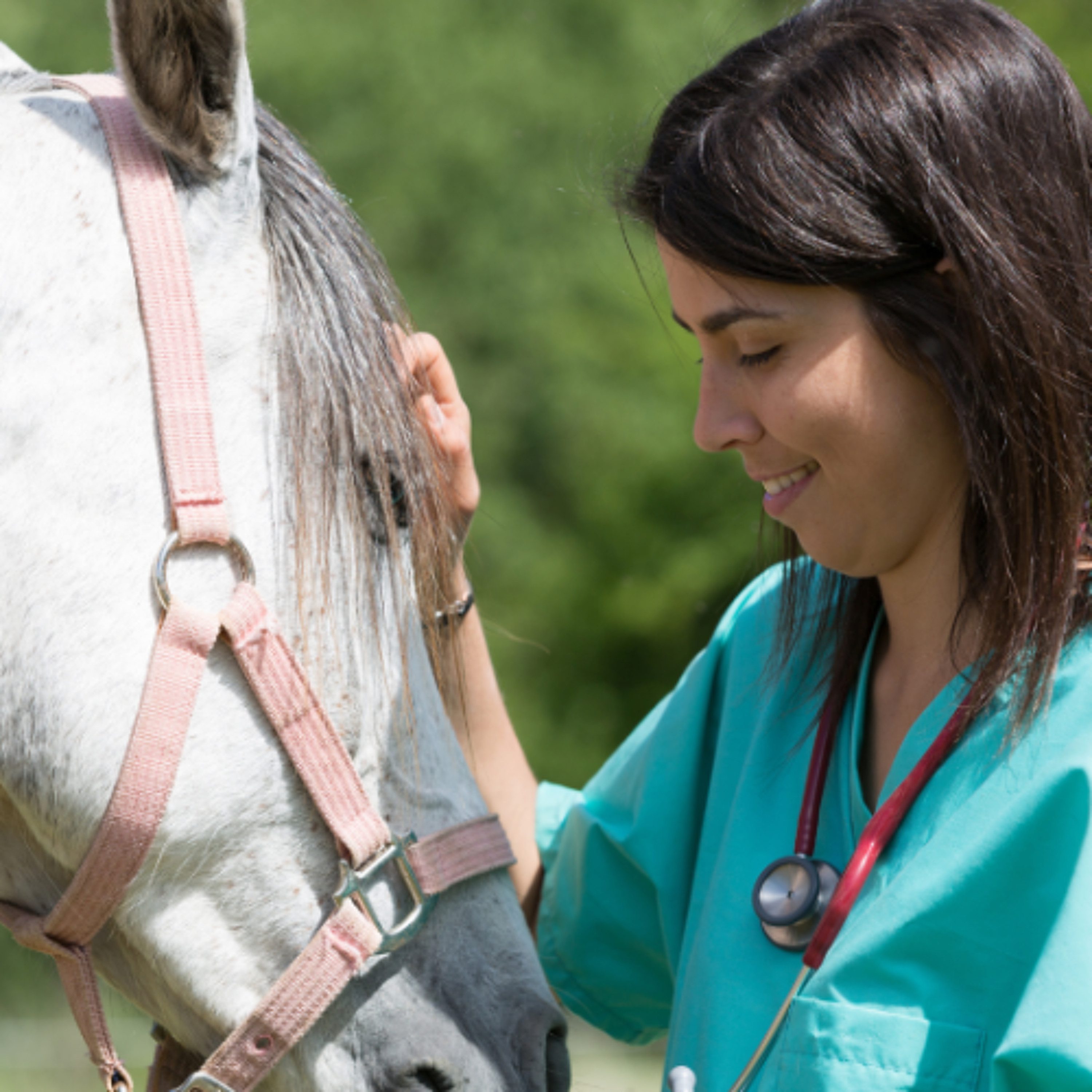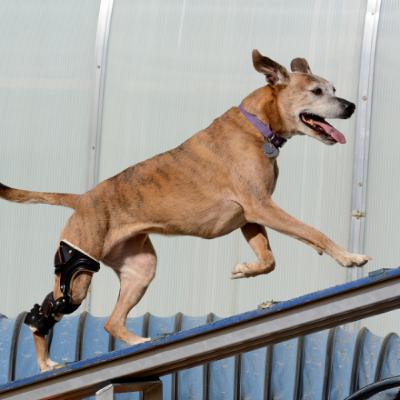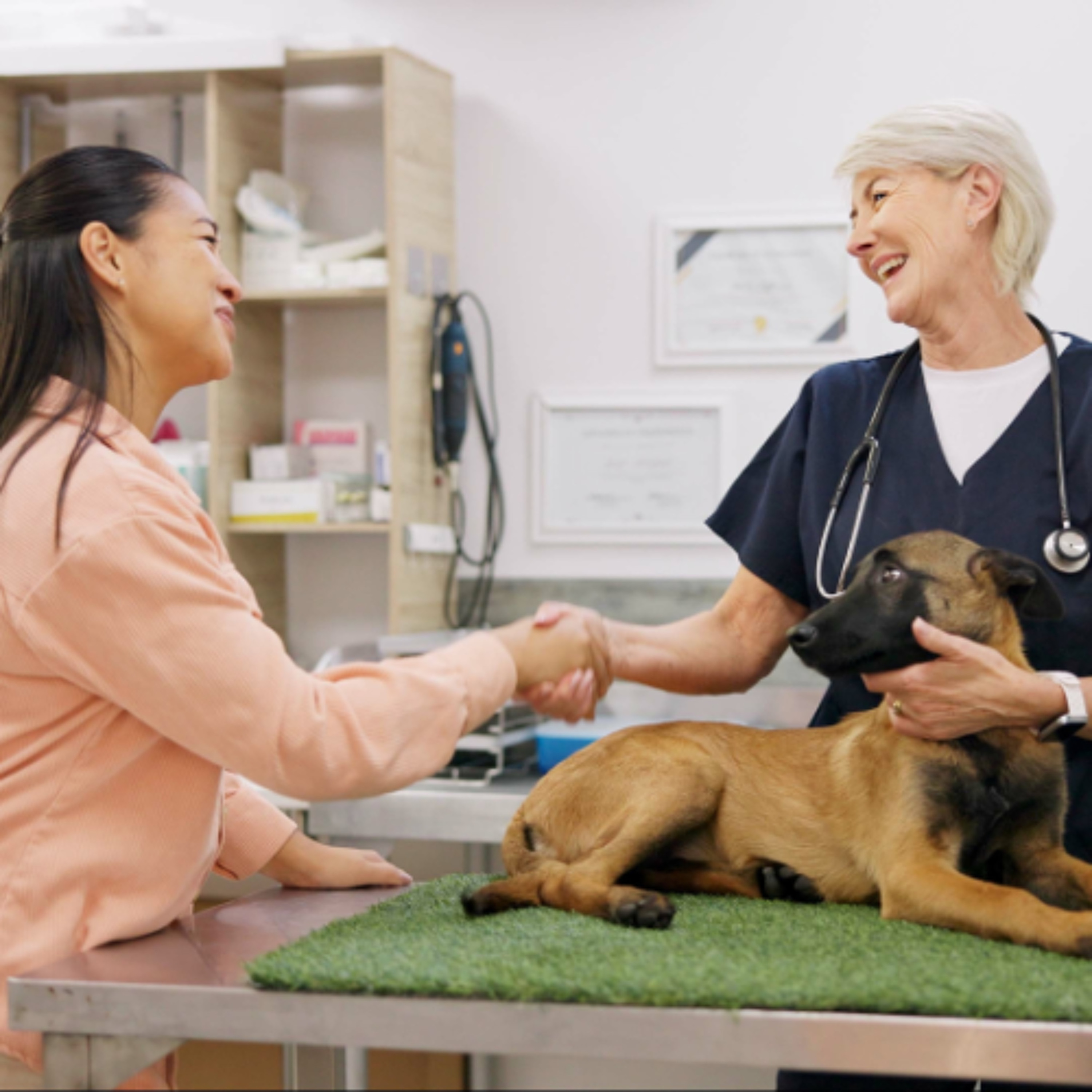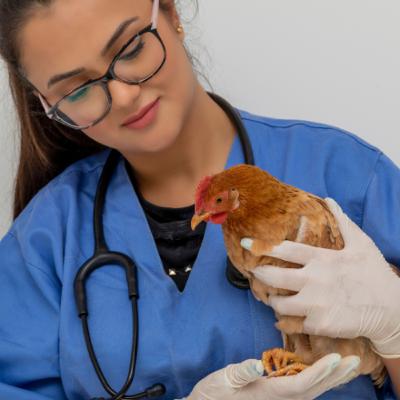Discover VetFolio Voice
VetFolio Voice

VetFolio Voice
Author: Powered by the NAVC
Subscribed: 787Played: 14,367Subscribe
Share
© All rights reserved
Description
Welcome to VetFolio Voice, the #1 Podcast Channel for the Veterinary Profession! New episodes every Thursday | Hosted by Dr. Cassi
The VetFolio Voice podcast series delivers weekly insights, industry news and useful information on topics that span the veterinary spectrum — from the latest medical breakthroughs to practice management tips. We make it easy to listen and learn on the go, whether during your commute, between clients in the clinic, or while tackling weekend chores!
VetFolio is an online educational platform powered by the NAVC, releasing new educational content weekly. Learn more at VetFolio.com.
The VetFolio Voice podcast series delivers weekly insights, industry news and useful information on topics that span the veterinary spectrum — from the latest medical breakthroughs to practice management tips. We make it easy to listen and learn on the go, whether during your commute, between clients in the clinic, or while tackling weekend chores!
VetFolio is an online educational platform powered by the NAVC, releasing new educational content weekly. Learn more at VetFolio.com.
378 Episodes
Reverse
The complex world within an animal’s gut is often viewed as a bustling city of microbes, each playing a vital role in health and disease. In this episode of the VetFolio Voice podcast, we not only discuss live probiotics and dietary prebiotics for understanding how the gut microbiome impacts an animal’s systemic health but also shift focus to a new frontier: postbiotics. Learn about the future of microbiome research and its therapeutic applications in veterinary medicine.
For many in veterinary medicine, the key goal is to give every pet their best life. For Dr. Sandra Faeh, that mission starts by investing in the careers of every team member, from the veterinarian to the technician to the customer service representative. Listen to this episode of the VetFolio Voice podcast as Dr. Faeh shares her leadership journey and advice on growth opportunities, including clinical mentorship, practice ownership, learning and leadership opportunities.
Get the recipe for relief for your canine patients suffering from both food allergies and bladder stones. In this episode of the VetFolio Voice podcast, we dive into the critical role of nutrition in managing these two common and often complex veterinary concerns. Tune in to explore a step-based approach to case management as well as learning some tools and resources to help make nutritional recommendations easier and to provide a safe, effective and balanced diet to keep these patients healthy, comfortable and thriving.
We’ll cover:
The technician's role in case management
Tools and resources for stone analysis and management
How to manage multiple health issues
Communication for clients with a multi-pet household
How to communicate diet changes effectively to pet owners
Animal ID apps? Ornitherapy and mindful birding? Forest bathing? What does all of that have to do with veterinary medicine and protecting wildlife? In this CE VetFolio Voice podcast episode, we delve into the world of wildlife conservation and how veterinary professionals can support conservation efforts, including using free apps based on AI technology to identify birds (including a sound feature that lets you listen to their songs), mammals and other animals. We also discuss how veterinarians can contribute to wildlife and conservation medicine through online programs and participating in programs designed to curb dog and cat populations around the world. Lastly, the concepts of ornitherapy and forest bathing—the Japanese practice of immersing oneself in nature to promote relaxation, reduce stress and boost the immune system—will show listeners how they can improve their mental and physical health by participating in such practices.
Do you take an “old-school” approach to broodmare care, focusing primarily on the final trimester? But what happens during the other eight months of the year? In this intriguing CE episode of the VetFolio Voice podcast, we explore managing broodmare care on a year-round basis, including nutrition, dental care, mobility, vaccination and deworming, as well as the implementation of light therapy during the winter months to optimize breeding dates.
There can be a lot of confusion surrounding a Cushing’s disease (hyperadrenocorticism) diagnosis. In this VetFolio Voice CE podcast episode, the panelists discuss how to communicate with clients and the common questions they ask when their dog has been diagnosed with Cushing’s, from diagnosis to treatment. In addition to learning how to navigate a client’s concerns, this episode delves into all aspects of the disease, including presentation, diagnostic test results, differentiation of disease type, comorbidities, monitoring and trilostane treatment.
Ixodes scapularis (eastern blacklegged tick) and Ixodes pacificus (western blacklegged tick) are the culprits behind transmitting Borrelia burgdorferi, the causative agent for Lyme disease. Veterinarians have the tools to diagnose and treat Lyme disease in their canine patients, but the serious health issues that Lyme disease can cause in dogs has made early diagnosis and treatment critical for successful outcomes. In this VetFolio Voice podcast episode, you’ll learn about ticks and tick-borne pathogens, specifically B. burgdorferi, and the diagnostic steps to take when a patient tests positive for Lyme antibodies as well as treatment considerations and prognosis. You’ll also hear about the importance of prevention when it comes to Lyme transmission and the tick preventative and vaccination strategies available to protect your patients.
It could be a bug bite. Or a harmless fatty lump. But it might be a mast cell tumor. In this episode of the VetFolio Voice podcast, we delve into mast cell tumors in dogs, including the unpredictable nature of these tumors, nuances around interpretation of cytology and histopathology reports, cytologic grading accuracy, and options for therapy including surgery, chemo, radiation and Stelfonta, an injectable mast cell tumor treatment for dogs. You’ll learn about staging considerations and the role of newer prognostic panels as well as strategies for client communication about mast cell disease.
The tapeworm Echinococcus multilocularis is normally found in rodents and other wild animals, such as coyotes and foxes, but it can affect dogs and even humans, posing a real threat to both. Despite historically being an endemic country for E. multilocularis, recent data suggests that this disease is emerging in a new way in the U.S. A potentially new strain is spreading into different wildlife reservoirs and new areas of the country. While new diagnostics are helping us identify more cases in dogs, the whole risk picture is still unclear. In this episode of the VetFolio Voice podcast, we talk about how this disease affects dogs, the best current diagnostic techniques, treatment options and how to protect pets and people!
What are the benefits of in-house blood film review? Oh, let us count the ways: less guesswork, faster diagnosis, better patient care, reduced client anxiety and more. In this episode of the VetFolio Voice podcast, we dive into the essentials of blood film review in the veterinary clinic, highlighting best practices and quality assurance strategies. We explore common challenges and share tips to improve your technique and boost your diagnostic confidence in daily practice.
Assistive device is a broad term that encompasses a wide array of tools and equipment designed to improve the health, comfort and mobility of animals. In this episode of the VetFolio Voice podcast, we explore assistive devices for stifle disease. We examine the types of stifle injuries that can be helped by an assistive device, as well as the intended purpose of different assistive devices and why they can be beneficial for managing certain conditions and be inappropriate in others. You’ll also learn about the pitfalls when it comes to choosing an assistive device and the pros and cons of this type of management compared to surgical intervention.
It’s a common occurrence (and mistake): A veterinarian decides to open their own practice, thinking it will lead to success. The issues related to this E-Myth in VetMed (the “e” stands for entrepreneurship) can be avoided when you focus on planning and developing processes and systems that allow entrepreneurial veterinary professionals to provide reliable, predictable outcomes for the patients that come through their doors. Having systems in place can help optimize the client experience, elevate the level of medicine practiced, and increase staff retention and job satisfaction. Tune into this episode of the VetFolio Voice podcast to learn about implementing a problem-solving approach to systems and ideas in your practice and discover where this way of thinking might take us in the future.
Talking about treatment costs with pet owners can be uncomfortable. For many clients, there is a growing gap in the ability to afford veterinary care, which threatens the sustainability of veterinary practices and exacerbates moral distress for veterinary care teams that are unable to provide pets with needed care. This can result in pets going without care, being surrendered or being euthanized. In this episode of the VetFolio Voice podcast, learn how Open Door Veterinary Collective developed and tested a financial triage process that veterinary teams can use to identify clients’ financial needs so they can be matched with a pay-over-time option that helps them afford and accept recommended diagnostic and treatment plans.
In this episode of the VetFolio Voice podcast, we sit down with Ron Sosa, Executive Director of the Uncharted Veterinary Conference and founder of Syn-APT Neuroinclusive Leadership, to explore what it means to lead with inclusion in mind, especially when supporting neurodivergent professionals in veterinary medicine.
Ron shares personal insights and practical strategies for recognizing traits, such as justice sensitivity, executive dysfunction and rejection sensitive dysphoria, not just as shortcomings but also as signals that call for empathy and adaptation. We dive deep into the concept of masking, how neurodivergence is often misunderstood or mislabeled as "toxic," and why embracing difference isn’t just kind but it’s also essential to the future of veterinary leadership.
Whether you’re neurodivergent, managing someone who is or simply curious about creating more psychologically safe workplaces, this conversation offers tools, frameworks and a refreshing new lens on what it means to lead well in VetMed.
Phosphorus control is crucial in managing canine and feline chronic kidney disease (CKD), particularly in cats. Because the disease is progressive and incurable, monitoring a cat with CKD is vitally important. With early detection and management, you can significantly extend your patient's lifespan and maintain a good quality of life. In this VetFolio Voice podcast episode, we delve into the monitoring of CKD in cats—including assessing Blood Urea Nitrogen (BUN), creatinine, Symmetric Dimethylarginine (SDMA), proteinuria and blood pressure—and how phosphorus can get lost in the shuffle, especially if it is within the normal reference range. Learn why it is important to continue to actively monitor and manage phosphorus since it is a disease accelerant even before the concentration leaves the normal reference range. We discuss the pathophysiology behind hyperphosphatemia, how to effectively monitor phosphorous levels in order to be able to intervene early, options for managing hyperphosphatemia and updates to the IRIS guidelines.
Cats are notorious for hiding discomfort and pain. In this episode of the VetFolio Voice podcast, we explore the behavioral and physical cues that a feline patient in chronic pain will exhibit and the importance of the owner's recognition of subtle changes and signs that may be noticeable only to them. You'll also learn about pain-management options and alternatives for treating a cat who is a master at disguising its pain.
Early and accurate diagnosis is essential for obtaining a good clinical outcome for veterinary patients with acquired myasthenia gravis. Tune in to this episode of the VetFolio Voice podcast to learn how it’s diagnosed and what treatment options are available. Host Dr. Cassi and guest Dr. Lauren Downey Koos also engage in a bigger conversation regarding neuromuscular disease.
Do you struggle with helping pet owners understand the medical information about their pet’s atopic dermatitis diagnosis or to comply with the treatment plan you’ve created to manage it? In this VetFolio Voice podcast episode, we go “beyond the itch” and chat about effective client communication when it comes to atopic dermatitis. We explore how complicated and nuanced this condition tends to be, illustrating why effective, informative and empathetic communication with clients is so important. Dr. Lancellotti tells Dr. Cassi how she designs her discharges to give clients a clear breakdown of the management plan and the function of each therapeutic recommendation. They delve into how additional tools can be useful, such as pre-written snippets and templates about atopic dermatitis, as well as providing other sources of information, including owner-facing podcasts, to help get information into owner’s hands and help answer their questions in the most efficient way possible.
Increasing numbers of people are getting backyard chickens and are coming to veterinarians with questions. And that's where you play a crucial role in keeping backyard chicken flocks healthy. As a general practitioner, are you confident in the care you provide to these patients? Tune in to this episode of the VetFolio Voice podcast and learn why chickens are great patients to work with if you are just starting in avian medicine. Dr. Cassi and Dr. Proenca delve into some of the aspects that need to be considered: the equipment that can help make working on chickens a bit easier, how our choice of medications needs to be guided by food animal standards and anesthesia. They demonstrate how we all possess much of the necessary knowledge to make good decisions for our patients, and how applying the same systematic thinking we apply to species we are not familiar with can readily extend to other species and allow us to treat our patients successfully—with care and compassion.
Hit subscribe to keep up with our latest VetFolio Voice podcast episodes!
Are you using fluorescent light therapy as a noninvasive treatment for dermatological conditions in your patients? In this episode of the VetFolio Voice podcast, learn about fluorescent light energy and how it can accelerate healing, its mechanism of action, different applications such as post-operative incisions and pyodermas, and the research that shows the impact of fluorescent light therapy in helping to shorten the duration of antibiotic therapy in conditions such as deep pyoderma. You'll also learn about antimicrobial stewardship and the importance of complementary therapies, such as light therapy, in reducing antimicrobial use as well as enhancing antimicrobial effectiveness. Get tips for implementing fluorescent light therapy in a busy practice and how it can be a profitable and rewarding therapy to offer to pets and their owners.

























this is that whole UBI business. what will happen os more like Readly Player One or The Hunger Games. Humans need work and purpose. Look what happens to retired people when they are not needed by work. they wither. no working and hobbies is in no way Utopia.
Wow! I love this interview. She is inspiring.